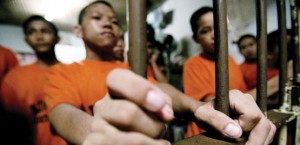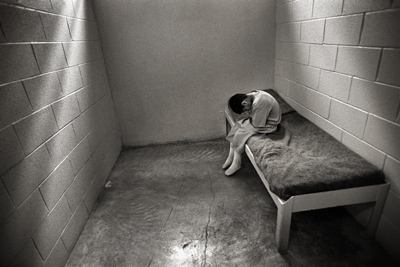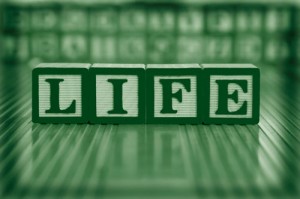This past June the Supreme Court overturned mandatory life sentences without the possibility of parole for minors on the grounds that it constituted “cruel and unusual punishment” under the 8th amendment. This comes on the heels of similar humanitarian rulings, such as getting rid of the death penalty for the mentally disabled and persons who commit their offense when under the age of eighteen. The Supreme Court did leave the final power with the judge who may use a life without parole sentence if they see fit, still giving state courts an “out” in the treatment of minors as adults to the dismay of many human rights groups.
The human brain does not stop in it’s development until the age of twenty-three- according to neurologists. It also re-organizes itself during vital years like the teen years. Re-organization plus a rush of hormones can make these years quite dramatic – and full of poor judgment, as anyone who has ever lived with a teenager knows. If you couple this with the fact that the brain will fail to develop at this peak time unless it is properly stimulated and guided, you have a cocktail for disaster for those living without the privilege of a safe home life or education.
Recent studies tell us that 70% of all juvenile offenders have reported something “bad or terrifying” happening to them in their lives, mainly witnessing the death or serious bodily harm of a loved one. The majority of these children are born addicted to drugs and alcohol, suffer physical., mental and sexual abuse from their caretakers and many have learning disabilities.
Cases involving juveniles sentenced to life run the gamut of violence: from Dominic C., who at the age of fourteen lured another fourteen year old to his Florida condo and beat him to death with fifty blows from a baseball bat for stealing marijuana – to Mike S. who sat in a van at the age of fourteen while his older brother and friends robbed and murdered a store owner.
While the ruling appears to be a step in the right direction as far as human rights watchers are concerned, an old problem remains at large: The rehabilitation of children with dangerous and violent pasts. Many children are housed right along with adults, and subjected to all kinds of violence including torture and rape. One young man, incarcerated to life behind bars at the age of fourteen, was forced by the adult inmates who used him for sex to have their names tattooed on his body to show their “ownership” of him. He was also targeted by guards for beatings due to his low standing in the prison “flow chart”. Another young offender tells the story of how at the age of fifteen, he was brought by guards to a cell with three adult inmates, given a drink (presumably with a narcotic in it) and then forcibly raped. Juvenile facilities (which tend to be overcrowded) fare no better, with high incidents of violence and substance abuse. They also tend to serve as a training ground for more violent and calculated crime upon the offenders release. They are severely lacking in education, with only 46% of juvenile offenders attending classes. Criminologists have reported that incarcerating young people actually slows down the maturation process and have found that those who spend time in a correctional facility are more likely to re-offend and offenders who are not incarcerated but are given mandatory therapy or work with drug and alcohol counselors are less likely to re-offend and “age out” of their criminal behavior.
Of course, there are states who are trying to fight this new ruling, most notably Wyoming – where three teenage boys (ranging in ages 15-18) were sentenced to life without the possibility of parole for a home invasion where the fifteen year old shot a man to death. There is no doubt that courts across the United States recognize the fact that children cannot be held accountable the same way that adults can. But the question remains open as to a solution. Simply loosening the mandatory sentences of life without parole is not even a drop in the ocean of the vast and epic fails of a pubic system gone haywire when it comes to the rehabilitation of young offenders. If anyone taught us that it’s Lionel Tate, who at the age of twelve violently killed a six year old girl his mother was babysitting. Claiming he was doing “wrestling moves” on her the girl wound up dead, with a fractured skull and ruptured spleen. Tate was charged as an adult and sentenced to life (which even shocked the prosecution). With an IQ of 90, and a baby face, Tate garnered a lot of sympathy from the public and courts- his case was overturned and he was released. He consequently violated his parole multiple times (once for carrying a knife) and finally at the ripe old age of eighteen was arrested for holding up a delivery man at gunpoint.
One of the most notorious cases of teen killers is the case of Charles Starkweather (eighteen) and his girlfriend Caril Ann Fugate (fourteen) who murdered eleven people on a spree that lasted two months. Starkweather was sentenced to die (and did via electric chair after seventeen months in prison) while his girlfriend served seventeen years, was released, worked as a medical assistant and married in 2007. She hasn’t had so much as a parking ticket.
There are victims to think about. The crimes that lead to a mandatory sentence are usually unspeakably violent – involving the brutal rape and murder of innocent people. How is justice served if the punishment does not fit the crime? Who wants to live next to someone who raped and murdered a seven year old, or who beat someone to death with a baseball bat?
The Supreme Court ruling will no doubt be the source of many an appeal across the country but the greater issue has yet to be tackled, rehabilitation.
__________________________________________________________________
For more on both sides of this slippery coin visit:
http://www.hrw.org/news/2005/10/11/united-states-thousands-children-sentenced-life-without-parole






